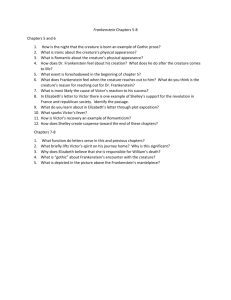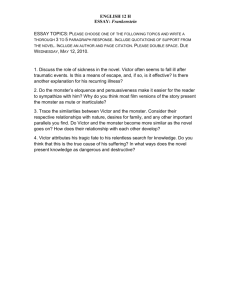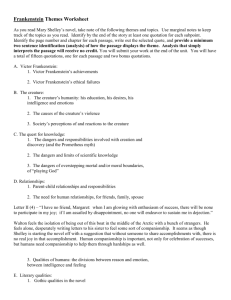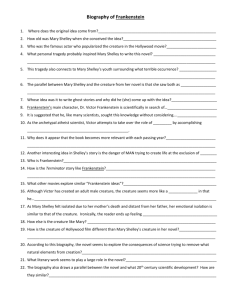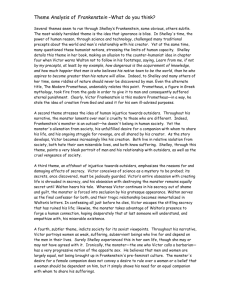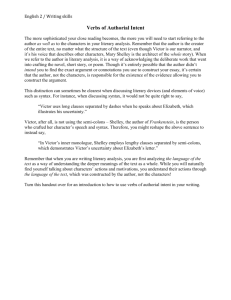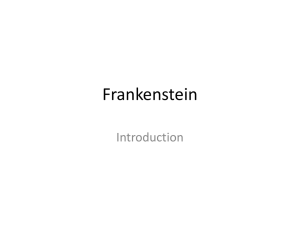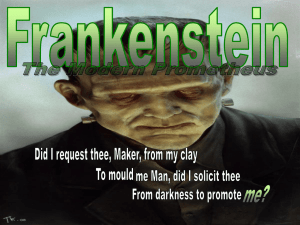Frankenstein Oral
advertisement
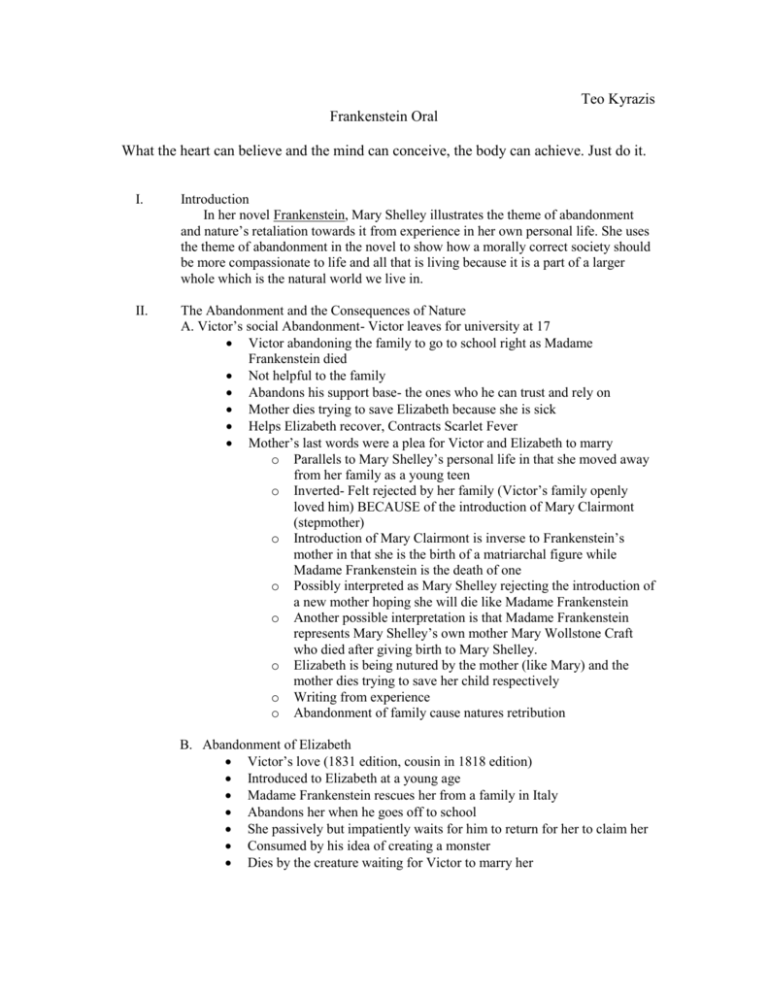
Teo Kyrazis Frankenstein Oral What the heart can believe and the mind can conceive, the body can achieve. Just do it. I. Introduction In her novel Frankenstein, Mary Shelley illustrates the theme of abandonment and nature’s retaliation towards it from experience in her own personal life. She uses the theme of abandonment in the novel to show how a morally correct society should be more compassionate to life and all that is living because it is a part of a larger whole which is the natural world we live in. II. The Abandonment and the Consequences of Nature A. Victor’s social Abandonment- Victor leaves for university at 17 Victor abandoning the family to go to school right as Madame Frankenstein died Not helpful to the family Abandons his support base- the ones who he can trust and rely on Mother dies trying to save Elizabeth because she is sick Helps Elizabeth recover, Contracts Scarlet Fever Mother’s last words were a plea for Victor and Elizabeth to marry o Parallels to Mary Shelley’s personal life in that she moved away from her family as a young teen o Inverted- Felt rejected by her family (Victor’s family openly loved him) BECAUSE of the introduction of Mary Clairmont (stepmother) o Introduction of Mary Clairmont is inverse to Frankenstein’s mother in that she is the birth of a matriarchal figure while Madame Frankenstein is the death of one o Possibly interpreted as Mary Shelley rejecting the introduction of a new mother hoping she will die like Madame Frankenstein o Another possible interpretation is that Madame Frankenstein represents Mary Shelley’s own mother Mary Wollstone Craft who died after giving birth to Mary Shelley. o Elizabeth is being nutured by the mother (like Mary) and the mother dies trying to save her child respectively o Writing from experience o Abandonment of family cause natures retribution B. Abandonment of Elizabeth Victor’s love (1831 edition, cousin in 1818 edition) Introduced to Elizabeth at a young age Madame Frankenstein rescues her from a family in Italy Abandons her when he goes off to school She passively but impatiently waits for him to return for her to claim her Consumed by his idea of creating a monster Dies by the creature waiting for Victor to marry her Ironic= Victor finally is going to claim her as his wife, but the creature takes her life, abandoning Victor of his love o Mary Shelley feels like a passive lover towards Percy Clerval in that he was married and she was waiting for him to marry her during the original publication of this work o Waits for him to marry her C. Main Example of Abandonment- The Creature Victor consumes himself with the idea of life Selfish Abandons all others while working on his creature Does not contact family in any way during his creation period (including Elizabeth) After creating the creature, Victor immediately abandons him because of his unaesthetic appearance that makes Victor repulse him. Monster is instantly rejected and abandoned, Victor runs away The monster feels lonely and hurt that Victor rejects him as his creator Creature wants to be loved by Victor o Effects Majority of novel details repercussions of abandoning the monster Monster retaliates by killing the family members of Victor who he has abandoned (Ch 7 kills William, younger brother of Victor, first murder, Monster plants evidence on Justine (Ch 7) as well, convicting her of the murder of William. She is executed (Ch 8) Creature Kills Elizabeth and Alphonse Frankenstein dies from the grief of it all) He kills because he wants to hurt Victor like he was hurt since he was abandoned Ironic in that had Victor stayed in contact and not abandoned his family, he would never have had time to brainstorm or create his monster. Would not have been isolated by himself and could have protected his family. Ironic= because of abandonment of monster, monster kills Elizabeth on Victor’s wedding day, retaliating against Victor who is now abandoned of love o Mary Shelley compares herself to the creature o Father, William Godwin, neglected her after a few years much like Victor neglected the creature after creating him D. Societal Abandonment of the creature Creature feels rejected by Victor Wants to fit into society Observes Delacey family Learns rudimentary skills by observing Surprisingly speaks eloquently Learns the bonds of family and love through observing Safie and Felix’s elation with her Presents himself to blind family member, other family members drive the monster away Share Victor’s reaction, run from the creature Although he learns all about society he is still rejected because of his appearance o Effects Creature realizes society will abandon him and reject him no matter what he tries to do to please them He is too different physically to ever be accepted Nature’s cruel retaliation on his acceptance Abandons hope of fitting into society Wants a mate so that he will no longer be abandoned o Compares to Mary Shelley’s view of her own life o Felt isolated and abandoned by her father who she adored o The creature adored his creator even though he was rejected by him o Wanted to please society but felt like she did not fit in o Wants a mate who will love her for herself E. Abortion The creature comes to Frankenstein pleading him to create a female who will love the monster (Ch 17) Victor agrees to create a female monster Victor agrees but has second thoughts and abandons the endeavor “When I thought of him, I gnashed my teeth, my eyes became inflamed, and I ardently wished to extinguish that life which I had so thoughtlessly made.” (Ch 3 after first creating the monster) “I, the miserable and the abandoned, am an abortion, to be spurned at, and kicked, and trampled on.” Creature said, (Ch 3) Creature shares Victor’s views of regret that he exists Victor Has doubts about the female creature (Ch 20) What if she doesn’t love him back? What if she is a killer? Will she find him hideous like the humans do and will he find her hideous as well? He is afraid they might reproduce creating, “a race of devils . . . on the earth.” (Ch 20) The monsters are abnormal beings that are supernatural Victor truly believes they should not procreate or they might start a new society of monsters Victor performs a form of abortion Throws the body parts into the ocean Does not appease the creature’s request Nature retaliates in the form of Victor getting charged with murder (Ch 20) o Mary Shelley writes about abortion because of her own fears with childbirth o Had 4 children die before adulthood o Had one miscarriage o o o o o o o o She feels that she is not a fit parent and that these lives were aborted Can relate to Victor, (unintentionally though) aborted her creations and internally takes a toll because she wants the new life of the babies while Victor does not want to create life and is publically accused Motif of revulsion of newborn life By Victor creating the monster, he is eliminating the need for a female to reproduce Shelley might desire the idea to create a child Nature’s form of retaliation- taking away the ones you love by abandoning the prospect of human (or monster) life The evil that befall them is a consequence of maltreatment of life Shelley and Victor both blame themselves for that maltreatment F. Abandonment of the Natural Gothic Literature- Exotic setting, Extraordinary characters, frees the reader’s mind from the natural Female Gothic Literature- Work women have dine since the early 18th century Creation of life through science Fantasy dominates over reality Shelley’s fantasy occurred in her dream which she The supernatural are introduced and are not accepted by the natural Mary Shelley’s structure of writing using women as a passive symbol Women in the novel suffer calmly and die or otherwise expire This writing style of more male dominance contradicts the natural way women of the time period wrote Shelley creates first work of this kind by bringing birth to fiction Exclusion of female for birth (supernatural form of creation via science and electrical current) Nature’s retribution against the supernatural through denial and rejection of the creature and Victor from society o Mary Shelley’s own experience with fantasy may have allowed her to extrapolate on this topic o Her dream of creation she had which she contributed to the idea of the novel o Recorded in her journal on March 19, 1815, "Dream that my little baby came to life again--that it had only been cold & that we rubbed it before the fire & it lived." o Supernatural version of rebirth using heat o Shelley viewed Nature’s repercussions were taking away the lives of her babies III. Conclusion Through the use of the theme of abandonment and nature’s retaliation towards it, Mary Shelley creates a work that reflects her own personal experience and view of how a society should function acceptably within the boundaries of the natural world. Using the creature and birth as the ultimate form of abandonment, Shelley relays this message in her novel Frankenstein.


